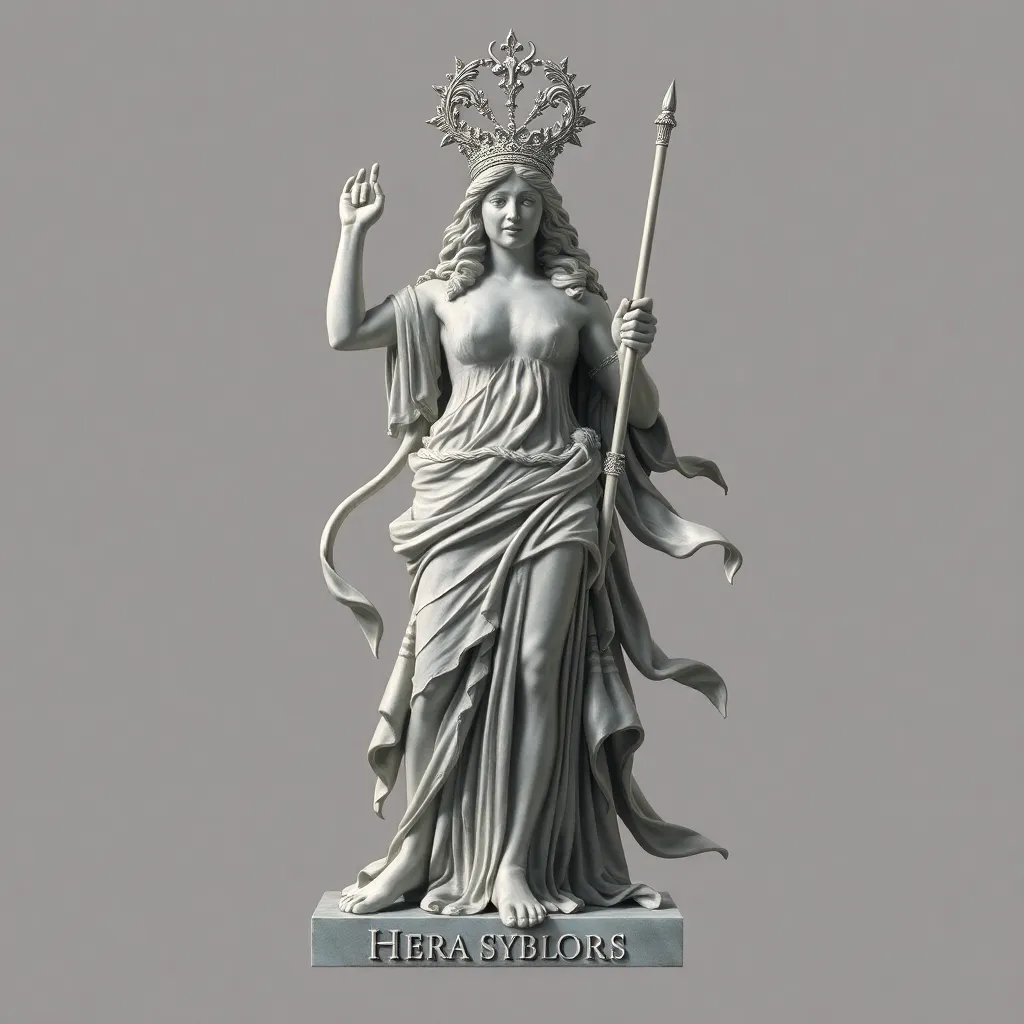Hera’s Symbolism in the Context of Greek Religion
Introduction to Hera: The Queen of the Gods
Hera, the Queen of the Gods, occupies a prominent place in Greek mythology as the wife of Zeus and the goddess of marriage and family. Revered for her dignity and power, she is often depicted as a matronly figure who embodies the ideals of womanhood and the sanctity of marriage. Hera’s presence in the pantheon of Greek deities is not only significant due to her marriage to Zeus, the king of the gods, but also because of her own important attributes and the roles she fulfills within Greek religious practices.
Hera’s Attributes and Epithets
Hera is associated with several key symbols that reflect her divine nature and responsibilities:
- Peacock: The peacock is perhaps the most iconic symbol of Hera, representing beauty, pride, and immortality.
- Cow: The cow symbolizes Hera’s nurturing qualities and her role as a protector of women and children.
- Wedding Ring: The wedding ring signifies her role as the goddess of marriage, indicating her connection to the institution of marriage and fidelity.
Hera also has numerous epithets that highlight different aspects of her character, such as:
- Hera Soteira: Meaning “Hera the Savior,” this title emphasizes her protective nature.
- Hera Argeia: This epithet signifies her association with the Argives, highlighting her local worship and importance in specific regions.
Hera’s Role as the Goddess of Marriage and Family
As the goddess of marriage and family, Hera plays a crucial role in the social fabric of ancient Greece. She is often invoked in marriage ceremonies, symbolizing the blessings of fidelity, love, and family unity. Hera’s own marriage to Zeus is a complex narrative that reflects both the sanctity and challenges of marital relationships. Despite the numerous infidelities of Zeus, Hera’s commitment to her role as the protector of marriage underscores the societal expectations placed on women and the importance of family in ancient Greek culture.
Hera’s Symbolism of Power and Authority
Hera is not just a goddess of domesticity; she is also a powerful figure within the divine hierarchy. Her authority is depicted in various myths where she exercises control over both gods and mortals. Hera’s representation as a powerful female deity challenges the traditional gender roles of her time, illustrating that women can hold significant power and influence. Her strength is often showcased through her cunning and strategic thinking, particularly in her interactions with Zeus and other Olympians.
Hera’s Relationship with Other Gods and Goddesses
The dynamics of Hera’s relationships with other deities reflect her complexity and the multifaceted nature of her character. Some notable interactions include:
- Zeus: Hera’s tumultuous relationship with her husband often serves as a focal point in many myths, highlighting themes of jealousy, betrayal, and reconciliation.
- Athena: Often regarded as a daughter of Hera, Athena’s wisdom and strategic prowess complement Hera’s maternal attributes.
- Aphrodite: The goddess of love often represents a contrast to Hera’s values of marriage and fidelity, leading to rivalries and conflicts in various myths.
These relationships contribute to Hera’s symbolism as a goddess who embodies both love and strife, showcasing the duality of her character.
Hera’s Representation in Art and Literature
Hera’s depiction in ancient Greek art and literature is rich and varied. She is often portrayed as a regal figure, adorned with a crown and holding a scepter, symbolizing her status as the queen of the gods. Many classical sculptures, pottery, and frescoes depict her alongside Zeus or in scenes that highlight her divine role and attributes.
In literature, Hera appears in numerous myths, such as:
- The Iliad: Here, her jealousy and manipulation are evident in her schemes against Zeus and her support of the Greeks in the Trojan War.
- The Argonautica: Hera plays a crucial role in aiding Jason and the Argonauts, showcasing her protective nature towards heroes.
These narratives not only illustrate her character but also reinforce her symbolism within Greek mythology.
Hera’s Worship and Cult Practices
The worship of Hera was widespread in ancient Greece, with numerous temples and festivals dedicated to her veneration. One of the most significant festivals was the Heraea, celebrated in Olympia. This festival featured athletic competitions for women, reflecting Hera’s association with femininity and the importance of women in society.
Temples dedicated to Hera, such as the Heraion at Argos, were centers of worship where rituals and sacrifices took place. Her worship often included:
- Prayers for marital harmony and family prosperity.
- Offerings of peacocks and cows, symbolizing her attributes.
- Rituals that honored women’s roles in society, emphasizing their importance in the domestic sphere.
Conclusion: Hera’s Lasting Legacy in Greek Religion
Hera’s multifaceted symbolism as the goddess of marriage, family, and female power reflects the complexities of ancient Greek culture. Her portrayal as a powerful yet nurturing figure continues to resonate, influencing modern interpretations of femininity and authority. Through her relationships, attributes, and the rituals dedicated to her, Hera remains a significant figure not only in mythology but also in discussions surrounding gender roles and the divine feminine in contemporary society.




